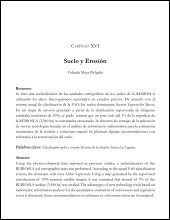Antioxidant responses of damiana (Turnera diffusaWilld) to exposure to artificial ultraviolet (UV) radiation in an in vitro model; part II; UV-B radiation
RESPUESTA ANTIOXIDANTE EN DAMIANA (TURNERA DIFFUSA WILLD) EXPUESTA A RADIACIÓN ULTRAVIOLETA (UV) ARTIFICIAL EN UN MODELO IN VITRO; PARTE II; RADIACIÓN UV-B
Autor
LLUVIA DE ABRIL ALEXANDRA SORIANO MELGAR
LILIA ALCARAZ MELENDEZ
LIA CELINA MENDEZ RODRIGUEZ
MARIA ESTHER PUENTE
FERNANDO RIVERA CABRERA
TANIA ZENTENO SAVIN
Metadatos
Mostrar el registro completo del ítemResumen
"Introduction: Ultraviolet type B (UV-B) radiation effects on medicinal plants have been recently investigated in the context of climate change, but the modifications generated by UV-B radiation might be used to increase the content of antioxidants, including phenolic compounds.
Objective: To generate information on the effect of exposure to artificial UV-B radiation at different highdoses in the antioxidant content of damiana plants in an in vitro model.
Methods: Damiana plantlets (tissue cultures in Murashige- Skoog medium) were irradiated with artificial UV-B at 3 different doses (1) 0.5 ± 0.1 mW cm-2 (high) for 2 h daily, (2) 1 ± 0,1 mW cm-2 (severe) for 2 h daily, or (3) 1 ± 0.1 mW cm-2 for 4 h daily during 3 weeks. The concentration of photosynthetic pigments (chlorophylls a and b, carotenoids), vitamins (C and E) and total phenolic compounds, the enzymatic activity of superoxide dismutase (SOD, EC 1.15.1.1) and total peroxidases (POX, EC 1.11.1), as well as total antioxidant capacity and lipid peroxidation levels were quantified to assess the effect of high artificial UV-B radiation in the antioxidant content of in vitro damiana plants.
Results: Severe and high doses of artificial UV-B radiation modified the antioxidant content by increasing the content of vitamin C and decreased the phenolic compound content, as well as modified the oxidative damage of damiana plants in an in vitro model.
Conclusion: UV-B radiation modified the antioxidant content in damiana plants in an in vitro model, depending on the intensity and duration of the exposure." "Introducción: Los efectos de la radiación ultravioleta tipo B (UV-B) sobre las plantas medicinales se han investigado recientemente en el contexto del cambio climático, pero las modificaciones que genera la radiación UV-B podrían emplearse para modificar el contenido de compuestos antioxidantes, incluyendo los compuestos fenólicos.
Objetivo: Generar información sobre el efecto de una alta exposición a UV-B artificial en el contenido antioxidante de damiana (Turnera diffusa, Willd) en un modelo in vitro.
Método: Plántulas de damiana en cultivo de tejidos (medio Murashige-Skoog) fueron irradiadas con UV-B artificial en 3 diferentes dosis: (1) 0,5 ± 0,1 mW cm-2 (alto) por 2 h diarias, (2) 1 ± 0,1 mW cm-2 (severa) por 2 h diarias, o (3) 1 ± 0,1 mW cm-2 durante 4 horas diarias por 3 semanas. Se cuantificó la concentración de pigmentos
fotosintéticos (clorofilas a y b, carotenoides), vitaminas (C y E) y compuestos fenólicos totales, la actividad enzimática de la superóxido dismutasa (SOD, EC 1.15.1.1) y las peroxidasas totales (POX, EC 1.11.1), así como la capacidad antioxidante total y la peroxidación de lípidos para evaluar el efecto de la alta radiación UV-B artificial en el contenido antioxidante de damiana in vitro.
Resultados: Dosis altas y severas de radiación UV-B artificial modificaron el contenido antioxidante incrementando el contenido de vitamina C y disminuyendo el contenido de compuestos fenólicos totales, además de modificar el daño oxidativo de plantas de damiana en un modelo in vitro. Conclusión: La radiación UV-B modifica el contenido antioxidante en damiana en un modelo in vitro, dependiendo de la intensidad y el tiempo de exposición."
Colecciones
Ítems relacionados
Mostrando ítems relacionados por Título, autor o materia.
-
PROMOCIÓN DEL PERIFITON PARA EL CULTIVO DE CAMARÓN BLANCO: HACIA UNA ACUICULTURA ECOLÓGICA
DOMENICO VOLTOLINA LOBINA; JUAN MANUEL AUDELO NARANJO; MARIA DEL ROSARIO PACHECO MARGES -
Suelo y Erosión
YOLANDA LOURDES MAYA DELGADO


